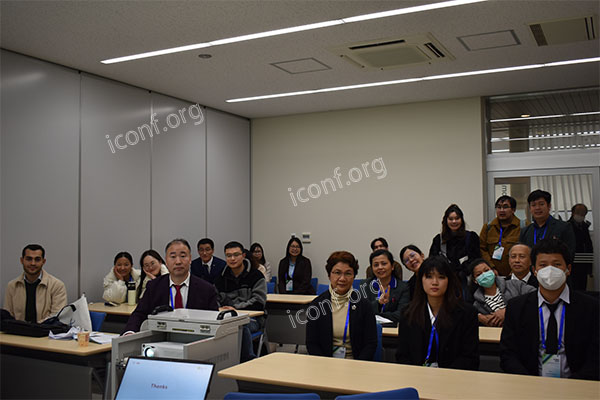Scopus-indexed conferences represent some of the most prestigious academic events, providing a platform for researchers to showcase their groundbreaking work to a global audience. These conferences offer more than just a venue for presenting research—they are gateways to enhancing your academic visibility, increasing citations, and advancing your career. Here’s why submitting to Scopus-indexed conferences in 2025 should be a key priority for researchers like you.

Why Attend and Present at Scopus-Indexed Conferences?
Academic Prestige and Credibility
Presenting at a Scopus-indexed conference signals that your research is of high academic quality. These conferences are recognized globally for their rigorous peer review process, attracting top-tier researchers and scholars. Being a part of such an event not only boosts your academic credibility but also positions your research within a respected academic community.Increase Citation Impact
Scopus is a highly influential citation database, and papers presented at Scopus-indexed conferences are often included in conference proceedings that are indexed by Scopus. This means your research has a greater chance of being cited by other researchers, boosting your citation count and academic impact. Higher citations directly contribute to an increased h-index, an essential metric for measuring academic productivity.Networking with Global Scholars
Scopus-indexed conferences gather top scholars, researchers, and professionals from around the world. This provides invaluable networking opportunities, allowing you to form collaborations, discuss ideas, and build relationships that could lead to future research partnerships or career advancements. These interactions also allow you to stay updated on the latest trends and methodologies in your field.Exposure to Cutting-Edge Research
Scopus-indexed conferences are often at the forefront of research in various disciplines. Presenting your work alongside leading researchers enables you to be part of the latest innovations and trends in your field. By attending, you also gain insight into cutting-edge research, which could help guide your future work or inspire new research directions.Enhance Your CV and Career
Successful presentation at a Scopus-indexed conference is a valuable addition to your academic CV. Many universities, research institutes, and funding agencies look favorably on conference presentations at high-impact events. It can be a key differentiator in securing funding, grants, and career opportunities.
How to Find Scopus-Indexed Conferences in 2025
Utilize Academic Conference Listings
Websites like iconf.com provide curated lists of upcoming Scopus-indexed conferences in 2025. These platforms make it easy to find conferences that match your research interests, along with submission deadlines and other essential details.Look for Conference Accreditation
When considering a conference, check if it is indexed by Scopus. Scopus-indexed conferences often prominently feature this information on their websites and promotional materials. If you're unsure, you can consult the previous year's conference proceedings to confirm whether they were indexed by Scopus.Subscribe to Conference Alerts
To stay ahead of conference opportunities, sign up for conference alerts. Websites like iconf.com offer email alerts tailored to your research topics, ensuring you’re notified when new Scopus-indexed conferences open for submissions. This proactive approach helps you avoid missing deadlines and keeps your conference schedule organized.Review Conference Call for Papers (CFPs)
Many Scopus-indexed conferences issue open Calls for Papers (CFPs). Reviewing CFPs for relevant events in your area of expertise helps you identify the best conferences for submission. Check these CFPs for submission guidelines, deadlines, and themes to ensure your research aligns with the event.
Tips for Successfully Submitting to Scopus-Indexed Conferences
Craft a Clear and Concise Abstract
Your abstract is the first thing reviewers will see, so it must clearly outline the key aspects of your research. Make sure it highlights your objectives, methods, findings, and the significance of your work in a concise manner. A well-written abstract increases your chances of acceptance.Follow Submission Guidelines Carefully
Every conference has its own submission guidelines. Ensure you follow these to the letter. This includes formatting, word limits, document types, and other specific instructions. Adhering to these guidelines is critical for a smooth submission process.Submit Early
Avoid last-minute submissions to ensure your paper receives full consideration. Submitting early allows you time to address any issues that may arise during the process, from technical problems to last-minute edits. Early submissions also demonstrate professionalism and commitment.Prepare for Your Presentation
Once accepted, start preparing for your presentation. Ensure that your slides are clear, informative, and visually engaging. Practice delivering your presentation to maintain confidence and clarity, as this will reflect well on both you and your research.
Start Presenting at Scopus-Indexed Conferences Today
Scopus-indexed conferences are an excellent way to enhance your research profile, expand your network, and make a significant academic impact. Whether you’re looking to increase your citations, share your groundbreaking research, or open doors to new opportunities, these conferences provide the platform to achieve your goals.
To find Scopus-indexed conferences that match your research focus in 2025, visit iconf.com. The platform offers detailed listings of upcoming conferences, submission guidelines, and deadlines, helping you stay on top of important academic events throughout the year.



